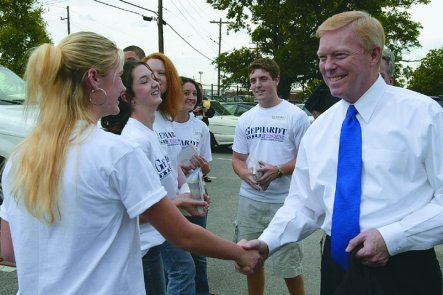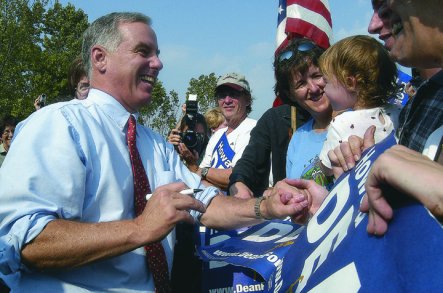
Fighting for their future: Gephardt's strong stand against
unfair trade deals means today's kids will be tomorrow's working
families.
Dick Gephardt flew in late the night before. Dressed in khaki
pants and a burgundy shirt, he dragged a black rolling suitcase
the size of a steamer trunk. Four days of campaigning had left
him hoarse but buoyed by his reception in Iowa.
Gephardt's afternoon had started with an endorsement by Berk
Bedell, an ex-congressman from Spirit Lake and the founder of an
international fishing tackle firm. At a fair in Cherokee, he
shook hands and chatted with local farmers. Then, he and his two
staffers raced to Sioux City for the two-hour flight to
Cincinnati.
A tall yet svelte man, Gephardt's blue eyes and blonde hair
hid his steely determination to win. Even a summer cold could
not dim his drive to win the Democratic presidential nomination.
During the thirty-minute ride from the airport, the candidate
asked about IAM jobs lost in airlines and aerospace. Reminded of
his efforts to save TWA and win contracts for McDonnell Douglas,
Gephardt made a mental note for the next morning. He knew that
the IAM's endorsement was his to lose with a lackluster
performance.
Howard Dean flew into Cincinnati the next morning. It was his
second stop.
Earlier in New York City, Dean appeared on Good Morning
America. The intelligence flap behind President Bush's State of
the Union Message was just heating up, and Matt Lauer wanted to
explore Dean's charge that the Bush Administration had misled
the American people. The interview was rebroadcast as Dean's
leased jet taxied to a stop.
Clad in a blue business suit and red tie, Howard Dean carried
an overnight bag and a laptop case. There was no trace of makeup
left from the GMA interview. The candidate was energized by his
four minutes on national TV.
As rush hour traffic thinned, Dean was briefed on the IAM's
staff conference, the impact of the Meridian Mississippi
shootings, and the likelihood of winning the union's
endorsement. Told that a straw poll of one territory had
produced forty votes for Dennis Kucinich, his response was "no
shit!"
Dean entered the Cincinnati convention center under no
illusions about how high the bar had been set.

Dean's campaign has fueled excitement among voters who
were turned off by the political system.
Are You Ready For This
Seven hundred sign-waving Machinists packed the room. Many
wore dark blue t-shirts emblazoned in gold with "JOBS! Worth
Fighting For." The hall reverberated with the rap song Are You
Ready For This.
After a brief introduction, Dean paused in memory of the IAM
brothers and sisters gunned down in Mississippi. He then
introduced himself as the only doctor in America with a 100
percent C.O.P.E. rating and the recipient of the AFL-CIO's Paul
Wellstone Award.
His first sustained applause came when he said, "This country
is in a lot of trouble because this president has no idea what
it means to get up and go to work for a living every day."
Dean complained that the "president's trade policies are
killing American jobs." He promised to oppose trade agreements
that lacked labor and environmental standards. And he claimed he
would "undo the ones we have."
"Look at what happened to Maytag," the former Vermont
governor urged, "why should we buy an appliance from them if
there are no labor standards and no environmental standards
where those appliances are made?
"If we want to export more than knickknacks and information
technology," Dean went on to say, we have to stop "transferring
our industrial capacity to other countries."
After castigating the Bush Administration for "hollowing out
our industrial capacity," Dean repeated his trademark phrase:
"We can do better."
His forty-minute speech included brief but pointed remarks
about health care and gun control. Both drew prolonged applause.
"I want health insurance," he emphasized, "for every single
American." And then he reeled off a list of a dozen nations that
have national health insurance starting with Canada and ending
with Costa Rica. His next question, why must we be second-class
citizens in this world, brought the entire conference to their
feet.
On gun control, Howard Dean pledged to "get guns off the
national agenda." He explained that Vermont does not have gun
control and that, if New York and California wanted stricter
laws, they could pass them. But he "wanted to get those union
votes back in our party."
Governor Dean ended his speech with a call to "stand up for
America again." He left the room to a standing ovation.
We Are Family
Fifteen minutes later, Congressman Dick Gephardt entered the
hall to the rocking refrains of We Are Family.
Escorted by the entire Missouri contingent, he snaked his way
through the crowd, shaking hands and greeting old friends. The
escort committee followed him onto the stage and stood behind
him throughout his speech. And what a speech he gave.
With a thumbs-up punch to crowd, Gephardt pledged to "always
fight for organized labor." His hoarse voice warmed as he
launched into an impassioned expose of President George W.
Bush's handling of the economy.
"President Bush doesn't understand what is happening to
working families in this country," Gephardt argued. "He is
attacking working families and attacking organized labor."
A Gephardt presidency would be far different. "I will fight
every day on every issue for good jobs for our people. I've been
there for twenty-seven years ... I fought at your side against
Carl Ichan and the corporate raider ideas that he had at TWA. I
fought with you and your members to stop him."
During the McDonnell Douglas strike in 1995, Gephardt
explained "people said it was insoluble. I put the parties
together and got an agreement worked out."
After ripping off a list of initiatives such as the F-15,
F18-A, the tanker leasing contract, and pushing Boeing to take
on Airbus, Gephardt reminded the audience that "I have been
there time and time again trying to build and save jobs at these
great companies. I've been fighting every day on every issue."
"I was the guy who was leading the fight," he reminded the
audience, "against my own president on NAFTA and China. I lost
by one vote on NAFTA and by a few votes on China."
A Manufacturing Policy
The heart of Gephardt's appeal focused on jobs. His voice
settled into a steady cadence and his tightly drawn face relaxed
as he laid out his solution to the decline of manufacturing
jobs.
"For the first time ever," Congressman Gephardt explained,
"this nation will have a trade, jobs and manufacturing policy
that will be designed in all its parts to hold on to and, in
fact, build new manufacturing jobs in the United States of
America."
Gephardt's manufacturing policy started off with "new trade
policies that will ask the World Trade Organization to have a
minimum wage on a worldwide basis." He then pledged to "amend,
change or repeal trade treaties that have put us on an unlevel
playing field."
As president, Gephardt said he would devise "tax policies
that will encourage companies to come to the United States, to
stay in the United States, to make products in the United
States, and discourage them from going to other countries."
Finally, a Gephardt presidency would "try to revise trade
treaties so that, if unfair trade is taking place, tariff
barriers are erected so products that are made under unfair
conditions cannot come into the United States."
I Will Not Rest
Health care was the next issue addressed by Congressman
Gephardt. He unabashedly claimed to have "the best plan. In my
first week, I will ask the Congress to rescind the Bush tax cuts
that haven't worked ... and use those monies to require every
employer to give [health care] plans to their employees.
"We will see to it that everybody in this country is covered
by health insurance. It must happen," pledged the Missouri
congressman.
"This issue is in my heart. It is in my head. It is in my
soul, and I will not rest as your president until I find the
solution to this problem," Gephardt explained.
Nearly seven hundred IAM elected leaders and staffers rose in
unison to give Dick Gephardt the loudest and longest ovation of
the day. The IAM's endorsement was sealed at that moment.
With the tune We Are Family blaring in the background,
Congressman Gephardt shook hands with the IAM's Executive
Council and plunged into a sea of JOBS! Worth Fight For shirts.
The Endorsement Vote
The demonstration of support and enthusiasm for Gephardt's
presidential bid lasted for fifteen minutes. The sustained
applause mixed with popping flashes as photographers sought to
capture the moment.
By the time Gephardt exited the room, those who would vote on
the endorsement knew the score: 90,000 IAM members had lost
their jobs since January 2001.
The men and women at the conference knew that the promised
economic recovery was a figment of the White House's
imagination. Where they worked, plants and shops were still
closing and unemployment lines were growing longer.
And they knew that the choice between Dick Gephardt and
Howard Dean boiled down to one word: loyalty. Loyalty meant
remembering the battles fought. Loyalty meant sticking with a
friend.
When the auditors finished their standing counts, Congressman
Dick Gephardt received 72 percent of the votes cast. Doctor
Howard Dean received 28 percent.
«
Poor Economy Drives the Debate
«
An IAM Nominee?